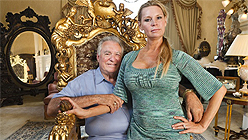When director Lauren Greenfield started filming The Queen of Versailles, a documentary about 74-year-old David Siegel, a billionaire timeshare magnate from Orlando, and Jackie, a trophy wife 30 years his junior, they had outgrown their 26,000-square-foot home.
To consider that unimaginable is to underestimate Jackie’s talent for filling it — with eight children, a second family of live-in nannies and housekeepers, pets both domesticated and exotic and enough tacky nouveau riche tchotchkes to inspire an entire season of Hoarders. Even Jackie’s generously augmented breasts take up a lot of space.
As the film opens, the Siegels are in the middle of building a $100 million monument to their success: a palace modeled after Versailles and the top of the Paris hotel and casino in Las Vegas. At 90,000 square feet, it would be the largest single-family home in America, with amenities that include a bowling alley, an ice-skating rink, a full-size baseball field, 30 bathrooms and the mother of all walk-in closets.
Then the housing market collapses, severely damaging David’s Westgate Resorts empire, which was built on the cheap money and subprime chicanery that torpedoed the economy. And when the credit suddenly dries up, the Siegels’ own private Versailles becomes just another item in a portfolio of toxic assets.
There’s a lot of fun to be had in laughing at the 0.001 percent in The Queen of Versailles, and even a certain amount of schadenfreude in witnessing their humbling reversal of fortune. But Greenfield’s superb documentary isn’t about stoking class resentment or indulging in Real Housewives-style soap opera or lifestyle porn.


